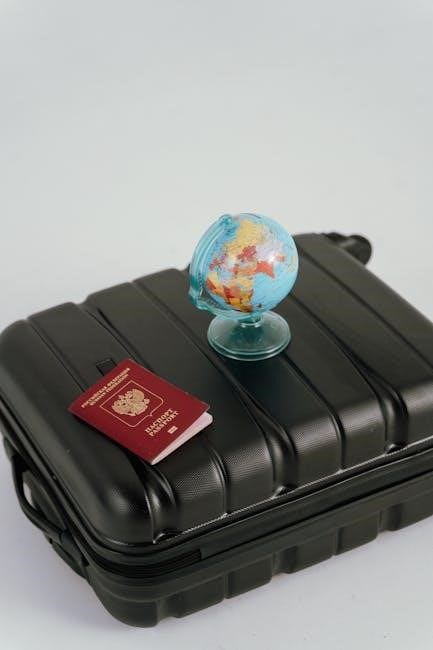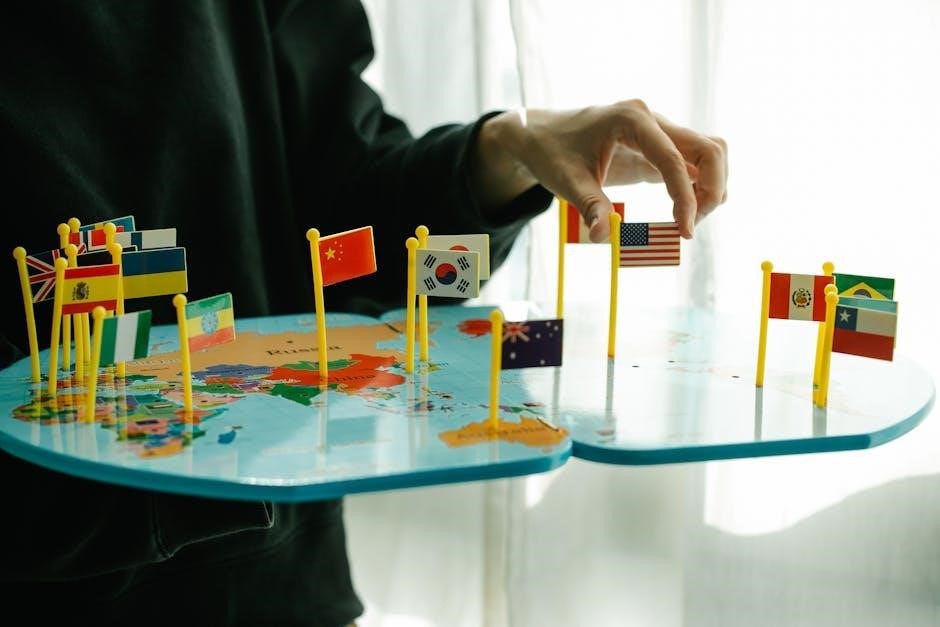Conference guides are essential for attendees to navigate events effectively‚ providing detailed schedules‚ speaker bios‚ and networking opportunities. They enhance engagement and ensure a seamless experience across industries.
Understanding the Importance of Conference Guides
Conference guides serve as vital resources for attendees‚ organizers‚ and speakers‚ ensuring a seamless and engaging experience. They provide detailed schedules‚ speaker bios‚ and venue maps‚ helping participants navigate events efficiently. These guides also highlight networking opportunities‚ showcasing how attendees can connect with industry professionals. By organizing information clearly‚ conference guides reduce confusion and maximize productivity. They are particularly crucial for large events‚ where attendees might otherwise feel overwhelmed. Real-world applications include enhancing attendee satisfaction‚ streamlining event logistics‚ and ensuring all participants are well-informed. A well-crafted guide can elevate the overall event experience‚ making it indispensable for modern conferences.
Key Components of a Comprehensive Conference Guide
A well-structured conference guide includes essential elements such as a detailed agenda‚ speaker profiles‚ and venue maps. It also features networking opportunities‚ session descriptions‚ and logistical information like parking and accommodations. Health and safety protocols‚ especially for in-person events‚ are critical. Additionally‚ the guide should outline sponsorship details‚ exhibitor booths‚ and engagement tools like QR codes or event apps. A comprehensive guide ensures attendees are well-informed and prepared‚ enhancing their overall experience. These components work together to create a seamless and organized event framework‚ catering to diverse attendee needs and preferences.
Preparing for a Conference
Research the agenda‚ create a personalized schedule‚ and pack essentials like business cards and chargers to ensure a productive and organized experience at the event.
Researching the Conference Agenda and Speakers
Understanding the conference agenda and speaker lineup is crucial for maximizing your experience. Review the schedule to identify key sessions‚ exhibitions‚ and networking opportunities. Research speakers’ backgrounds to gain insights into their expertise and topics. Familiarize yourself with keynote addresses‚ panel discussions‚ and workshops. This preparation helps you prioritize sessions aligned with your interests and goals. Additionally‚ explore any special events or activities‚ such as roundtable discussions or networking receptions. A well-researched approach ensures you make the most of your time and engage meaningfully with the content and attendees.
Creating a Personalized Schedule
Building a tailored schedule is key to optimizing your conference experience. Start by listing must-attend sessions‚ workshops‚ and networking events. Use conference apps or digital tools to organize your day‚ ensuring time for breaks and spontaneous interactions. Prioritize sessions based on your goals and interests‚ and leave room for flexibility. Consider downloading the conference app to access real-time updates and notifications. Additionally‚ note keynote addresses and special events. A well-planned schedule helps you stay focused‚ maximize engagement‚ and make the most of your time. Don’t forget to sync your schedule across devices for easy access throughout the event.
Packing Essentials for Attendees
When preparing for a conference‚ pack smartly to ensure comfort and productivity. Bring your ticket or registration confirmation‚ business cards‚ and a portable charger for your devices. Include a notebook and pen for note-taking‚ along with a reusable water bottle and snacks for breaks. Wear comfortable attire and shoes‚ as you’ll likely be moving around. Don’t forget a small backpack or bag to carry essentials like a sweater‚ extra pens‚ and brochures. Pack a travel-sized first-aid kit and any personal care items. Lastly‚ include a list of key contacts and sessions you plan to attend. Stay organized and prepared for a seamless experience.
Technology in Modern Conferences
Modern conferences leverage state-of-the-art tools like AI-powered apps and virtual platforms to enhance networking‚ engagement‚ and accessibility for both in-person and remote attendees globally.
State-of-the-Art Tools for Virtual and Hybrid Events
Virtual and hybrid events now utilize cutting-edge technologies like AI-driven platforms‚ interactive chatbots‚ and immersive VR experiences. These tools ensure seamless integration of in-person and remote attendees‚ fostering engagement through real-time Q&A‚ live polls‚ and virtual networking lounges. Advanced video conferencing systems with high-definition streaming and noise-cancellation features enhance presentation quality. Additionally‚ cloud-based event management software streamlines logistics‚ from registration to analytics‚ providing organizers with data-driven insights to optimize future events. These innovations are revolutionizing the way conferences are conducted‚ making them more accessible and interactive than ever before.

Utilizing Conference Apps for Networking
Conference apps have become indispensable for networking‚ offering features like attendee directories‚ matchmaking algorithms‚ and AI-driven recommendations. These platforms enable participants to connect based on shared interests or professional goals. Many apps include chat functionalities‚ virtual meeting rooms‚ and social media integration‚ fostering deeper engagement. Gamification elements‚ such as earning badges or points‚ encourage active participation. Additionally‚ apps often provide personalized schedules and reminders‚ ensuring attendees never miss key sessions or networking opportunities. By leveraging these tools‚ conferences create dynamic‚ interactive environments that enhance collaboration and professional growth for all participants.
Real-World Applications of Conference Guides
Conference guides are vital for successful event management‚ offering practical tools for attendee engagement‚ session navigation‚ and networking. They ensure seamless experiences and maximize the event’s value.
Case Studies: Successful Conference Management
Shangri-La Dubai implemented strict health guidelines‚ enhancing attendee safety. A Saint Petersburg conference organized by Best Event Group used traditional formats for seamless execution. KN Tech’s Sochi event showcased innovative marketing strategies‚ proving effective planning and guide utilization. These examples highlight how well-structured guides ensure engagement‚ safety‚ and operational efficiency‚ making conferences memorable and impactful for all participants. They demonstrate the importance of tailored approaches and meticulous preparation in achieving success.

Best Practices for Engaging Attendees
Engaging attendees requires a mix of interactive sessions‚ personalized experiences‚ and clear communication. Utilize polls‚ Q&A sessions‚ and networking icebreakers to foster participation. Provide a detailed yet easy-to-navigate schedule‚ allowing attendees to tailor their experience. Leverage technology‚ such as conference apps‚ to facilitate connections and feedback. Ensure accessibility for virtual participants by offering on-demand content. Post-event surveys and follow-ups can gather insights for improvement. By prioritizing attendee needs and preferences‚ conferences can create meaningful‚ impactful experiences that leave a lasting impression and encourage future participation.

Conference Planning Checklist
A detailed timeline ensures smooth execution‚ from venue selection to finalizing agendas and health protocols‚ helping organizers stay on track and manage all logistical aspects effectively.
Timeline for Organizers: From Venue Selection to Execution
A detailed timeline is crucial for successful conference planning. Start with venue selection and budgeting 9-12 months in advance‚ followed by speaker coordination and attendee registration. Finalize agendas‚ marketing materials‚ and vendor contracts 3-6 months prior. Conduct venue walkthroughs and confirm logistics 1-2 months before the event. Ensure health and safety protocols are in place. Review contingency plans and communicate updates to stakeholders. On-site coordination‚ staff briefings‚ and attendee check-ins occur during the final week. Post-event‚ gather feedback and settle payments within 30 days. A structured timeline ensures seamless execution and enhances attendee satisfaction.

Health and Safety Protocols for In-Person Events
Ensuring attendee well-being is paramount. Implement strict sanitation protocols‚ provide hand sanitizer stations‚ and promote mask-wearing in crowded areas. Social distancing measures‚ such as spaced seating‚ should be maintained. Conduct temperature checks and health screenings upon entry. Train staff on emergency procedures and first aid. Communication is key—share safety guidelines in advance and display them prominently at the venue. Hotels like Shangri-La Dubai have successfully applied such protocols‚ enhancing attendee confidence. Regular cleaning of high-touch areas and adequate ventilation are also essential. These measures ensure a safe and hygienic environment‚ fostering a positive experience for all participants.

Future Trends in Conferences
Emerging technologies like AI and VR are reshaping events‚ offering immersive experiences. Sustainability practices‚ such as hybrid formats and eco-friendly venues‚ are becoming increasingly popular in 2025.
Emerging Technologies and Innovations in Event Planning
Emerging technologies are revolutionizing event planning‚ with AI-driven tools streamlining logistics and personalizing attendee experiences. Virtual and hybrid event platforms integrate seamlessly‚ offering immersive engagement. Advanced data analytics enable real-time feedback‚ optimizing event strategies; Augmented reality enhances exhibits and presentations‚ while blockchain secures ticketing systems. Sustainable practices‚ like carbon footprint tracking‚ are gaining traction. These innovations ensure events are more efficient‚ engaging‚ and environmentally conscious‚ setting a new standard for modern conferencing in 2025 and beyond.
Sustainability Practices in Modern Conferences
Modern conferences prioritize sustainability through eco-friendly practices. Venues are selected for energy efficiency‚ waste reduction‚ and recycling programs. Digital materials replace paper‚ minimizing environmental impact. Hybrid events reduce carbon footprints by limiting travel. Sustainable catering uses locally sourced‚ organic food. Attendees are encouraged to participate in green initiatives. These practices not only align with global environmental goals but also enhance the conference’s reputation and attendee satisfaction. Implementing such strategies ensures a greener future for events while maintaining high standards of organization and engagement.
Networking Opportunities
Conferences offer invaluable networking chances through sessions‚ apps‚ and social events. Attendees connect with professionals‚ fostering collaborations and career growth in dynamic‚ engaging environments.
Strategies for Effective Networking
Effective networking at conferences involves preparation and intentionality. Research attendees beforehand‚ set clear goals‚ and engage actively in discussions. Utilize conference apps to connect with professionals and join relevant sessions. Follow up with new contacts post-event to build lasting relationships. Dress professionally‚ bring business cards‚ and be approachable. Engage in icebreakers‚ ask open-ended questions‚ and listen actively to foster meaningful conversations. Networking is about building connections‚ not just collecting contacts‚ so focus on mutual benefits and genuine interactions to maximize your conference experience.
Volunteering and Scholarship Opportunities
Volunteering at conferences offers unique chances to engage deeply with events while contributing to their success. Many conferences provide scholarships or reduced fees for volunteers‚ making participation more accessible. Applicants typically submit forms outlining their interests and availability. Scholarships often cover registration‚ travel‚ or accommodation‚ encouraging diversity and inclusion. Volunteering also enhances networking opportunities and provides behind-the-scenes insights into event management. Check conference websites for these programs‚ as deadlines can be early. These roles are a great way to give back‚ gain experience‚ and attend events that might otherwise be financially out of reach.

Budgeting and Cost Management
Effective budgeting ensures financial efficiency for conferences. Allocate funds wisely for venue‚ catering‚ and technology. Track expenses to maximize ROI and minimize unnecessary spending.
Financial Planning for Attendees and Organizers
Financial planning is crucial for both attendees and organizers to manage conference-related expenses effectively. Budgeting helps allocate resources efficiently‚ ensuring costs are covered without overspending. Attendees should plan for tickets‚ travel‚ and accommodations‚ while organizers must budget for venue rentals‚ catering‚ and speaker fees.
Exploring sponsorship opportunities and cost-saving measures can reduce financial burdens. Organizers can also offer scholarships or discounted tickets to make the event more accessible. Tracking expenses and sticking to a predefined budget ensures transparency and accountability‚ maximizing ROI for all stakeholders involved.
